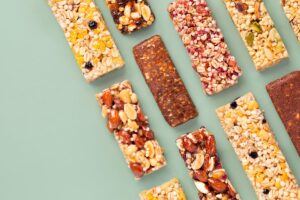The health risks associated with ultra-processed foods have been getting a lot of attention recently. Not only have they been associated with higher risk of obesity and several other chronic conditions, but new research is shedding even more light on the negative impact they can have on your health.
What’s more is that Canadians are consuming more ultra-processed foods than ever, with these products making up 43.4 percent of the daily energy intake of adults 20 and older, according to a recent study by the Heart and Stroke Foundation of Canada.
You may also be surprised to learn that ultra-processed foods also include some surprising items labelled as health foods — it’s not just junk food like candy and chips.
This article is for informational purposes only and is not a substitute for professional medical advice, diagnosis or treatment. Contact a qualified medical professional before engaging in any physical activity, or making any changes to your diet, medication or lifestyle.
Of course, risks associated with ultra-processed foods aren’t limited to one age group, body type or socioeconomic demographic. But if you’re over 50, you may want to be especially mindful of how much of these all-too-common staples you consume. Read on for more information on the risks — and which foods to avoid on your next grocery run.
Why are ultra-processed foods so bad for your health?
“It’s important to avoid ultra-processed foods, as there is mounting evidence that they negatively impact the diversity of bacteria in your gut,” said Dr. Michael Schopis, MD, a gastroenterologist at Manhattan Gastroenterology in New York.
“Studies suggest that ultra-processed foods may increase the growth of pro-inflammatory organisms and decrease the growth of protective bacteria in the intestine. Moreover, some studies suggest that ultra-processed foods may impair intestinal barrier function which may ultimately lead to an inflammatory state.”
When trying to identify ultra-processed foods, look for things like additive colours and flavour enhancers. (Photo via Getty Images)
Inflammation isn’t all bad — it’s your body’s response to injury, disease and infection-causing bacteria and viruses, and it aids in healing. But when inflammation persists, it can cause numerous health issues.
Aging leads to persistent inflammation, which has been dubbed “inflammaging.” This chronic, low-grade inflammation can impact brain health and lead to frailty. Researchers believe it’s also the reason our risk of certain diseases increases with age, including Alzheimer’s diseasecancer, and heart disease.
To boot, ultra-processed foods are now known to be responsible for more than a third of heart and stroke deaths in Canada.
What exactly are ultra-processed foods? How do you know if something is ultra-processed?
“Ultra-processed foods can sometimes be difficult to identify,” says Schopis. “The simplest way of knowing what’s ultra-processed is by reading the nutritional label and looking for the presence of cosmetic or preservative additives that either improve the taste of the foods or extend its shelf-life.”
Common ultra-processed ingredients to look for are things like:
A good rule of thumb is to look for the inclusion of ingredients you don’t find in your kitchen.
While all processed foods contain additives like these, ultra-processed foods typically contain many more added ingredients.
“Typical foods that fall into this category are sugar-sweetened beverages — think energy drinks or sodas, candies, savoury or sweet packaged snacks — think flavoured chips or cookies, instant noodles, ready-to-heat pizzas or pastas or processed meats,” says Schopis.
Sneaky ultra-processed foods to avoid if you’re 50+
These are typically considered the worst ultra-processed foods because they tend to be highest in sugar, sodium and saturated fats which can raise cholesterol and lead to obesity. But, if you’re over 50, there are several seemingly-healthy staples to also be aware of, including those found in the health food aisle.
Research shows that many older adults consume ultra-processed foods regularly for several reasons, ranging from their affordability and convenienceto simply being foods that they’ve consumed throughout their lives.
And, with many Canadians over 50 reporting that they actively try to eat healthysome may be turning to ultra-processed foods labelled as being natural, healthy or organic without even realizing it.
Keep in mind that while the original ingredients in a product may well be natural or organic, the process by which the food was made is what makes it ultra-processed, and in turn, less healthy.
Beyond the main offenders, there are some sneakier ultra-processed foods, like some cereals and breads, that you should avoid as you get older. (Photo via Getty Images)
If you’re over 50, try to avoid these ultra-processed foods:
-
Ready-to-eat meat, seafood and poultry products
-
Protein and energy shakes
-
Meal replacement shakes and powders
-
Instant soups (powdered and packaged)
How to cut back on ultra-processed foods
Availability and affordability may make it difficult to completely avoid ultra-processed food — and some ultra-processed foods are fortified with important vitamins and minerals, like vitamin D and iron, which are crucial for good health.
And, let’s face it, some of these are just so darn tasty that you can’t imagine saying goodbye to them forever.
If you’re looking to cut back, here are some ways to help you eat better and cut back on ultra-processed foods:
-
Read nutritional labels and avoid foods with lots of additives
-
Limit ultra-processed foods to those with a higher nutritional value
-
Look for healthier substitutes, like plain yogurt over flavoured options
-
Cook yourself more often using whole foods as much as possible
Let us know what you think by emailing uscommenting below and tweeting @YahooStyleCA! Follow us on Twitter and Instagram.











